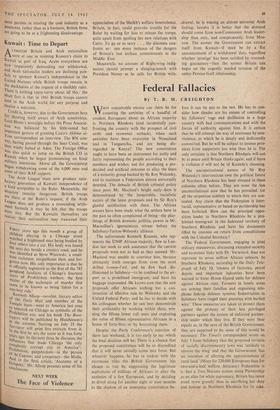Federal Fallacies
By T. R. M. CREIGHTON WHAT conceivable excuse can there be for cosseting the anxieties of a handful of resident Europeans about an African majority in Northern Rhodesia (and incidentally con- fronting the country with the prospect of civil strife and economic setback), when such anxieties have been overcome in Nyasaland and in Tanganyika, and are being dis- regarded in Kenya? The new constitution ought to have been an instrument for justly and fairly representing the people according to their numbers and wishes, not for producing a pre- decided and artificial outcome to allay the fears of a minority group backed by Sir Roy Welensky, and to maintain a Federation almost universally detested. The debacle of British colonial policy since poor Mr. Macleod's 'bright early days is demonstrated by the inequitable, racialistic nature of the latest proposals and by Sir Roy's gleeful satisfaction with them. The African masses have been made what the settlers have in the past so often complained of being—the play- things of British domestic politics, pawns in Mr. Macmillan's ignominious retreat before the Salisbury-Turton-Welensky alliance.
The unfortunate Kenneth Kaunda, who rep- resents the UNIP African majority, flew to Lon- don last week to seek assurance that the current proposals were not as bad as they seemed. Mr. Macleod was unable to convince him, because ultimately truth emerges from even the most skilled trompe-l'tril,- and he flew back dis- illusioned to Salisbury—to be confined to the air- port as a prohibited immigrant, and have his baggage impounded. He knows now that the new proposals offer Africans nothing but a con- tinuation of effective rule by Welensky and the United Federal Party; and he has to decide with his colleagues whether he can best demonstrate their artificiality by working within them, win- ning the fifteen lower roll seats and exploiting the value of fifteen representative Africans in a house of forty-five; or by boycotting them.
Despite the Party Conference's rejection of them last weekend, it is too early to say which the final decision will be. There is a chance that the proposed constitution will be so discredited that it will never actually come into force. But whatever happens, he has to reckon with the enormous risks the British Government has chosen to run by suppressing the legitimate aspirations of millions of Africans to allay the anxieties of a few Europeans, and by deciding to drool along for another eight or nine months in the shadow of an unpopular constitution be- fore it can be put to the test. He has to con- sider how slender are his means of controlling his folloWers' rage and disillusion in a huge country with bad communications and with the forces of authority against him. It is certain that he will attempt the way of resistance by non- violence, to which he is deeply and dedicatedly committed. But he will be subject to intense pres- sures from supporters less wise than he is. The only certainty is that Northern Rhodesia will not be at peace until Britain thinks again; and if th,ere is violence it will not be of Kaunda's choosing.
The unconstitutional nature of Sir Roy Welensky's interventions over the political future of Northern Rhodesia has been stressed in these columns often before. They are none the less unconstitutional now that he has prevailed, for all the serpentine subtlety in which they are con- cealed. Any claim that the Federation is inter- racial, representative or based on partnership has been forfeited. 'How can the principal oppo- sition leader in Northern Rhodesia be a pro- hibited immigrant in the federated territory of Southern Rhodesia and have his documents rifled by customs on return from consultations with the Colonial Secretary?
The Federal Government, engaging in joint military manceuvres. discussing extended security and economic links with Dr. Verwoerd, does not represent its seven million African subjects. In Southern Rhodesia, according to the Daily Tele- graph of July 10, 'owners of factories, petrol depots and important industries have been warned to form Home Guard units for defence against African riots. Farmers in lonely areas are arming their families and organising tele- phone link-up defence systems. Industrialists in Salisbury have ringed their premises with barbed wire.' These measures are taken to protect them against the protests of their less privileged partners against the system of enforced partner- ship under which they live. If they were their equals as, in the eyes of the British Government, they are supposed to be, none of this would be necessary. The Times's correspondent wrote on July 5 from Salisbury that the proposed revision of racially discriminatory laws was 'unlikely to remove the sting' and that the Government `has no intention of altering the apportionment of rural land.' (More for 220,000 Europeans than for two-and-a-half million Africans.) Federation is it, fact a Two Nations system using Partnership as an alias for white supremacy. Britain has never erred more gravely than in sacrificing her duty and honour in Northern Rhodesia for its sake.


































 Previous page
Previous page